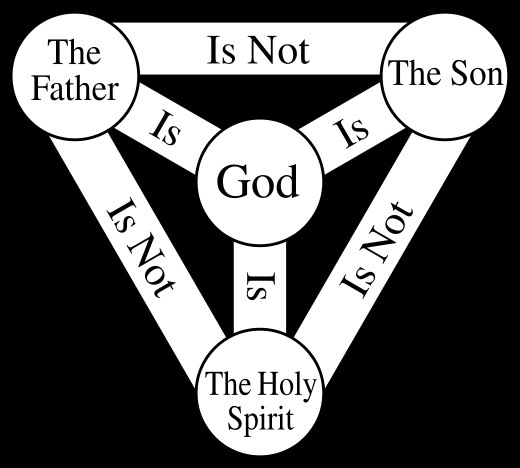wordsout
Welcome
To The Real World
<
41 of 59
> trinity >
The Trinity monologue
in the manner of Stanley Holloway
The
Early
Fathers of the church, in Asia Minor
(that’s Turkey to the likes of you and me)
once decided that nothing would be finer
than to have a get-together by the sea.
In AD 325 (or somewhere near)
they found a place with which they were content:
they looked around and said Well, it’s Nicaea—
just the place to have a Council!—so they went.
They
did
things to make religion more reliable,
outed heresies and voted bishops in,
even settled on which books make up the Bible—
then sat back and let the great debate begin.
On
one
side they said that God was undivided;
on the other, Father, Son and Holy Ghost.
For a time it seemed that it would be decided
by the volume of the side that shouted most.
But
the
Council wouldn’t let this fuss defeat it—
a resourceful synod it would prove to be,
for they saw that they could have their cake and eat it
and they came up with the Holy Trinity.
God
was
One, and he could not be put asunder:
yet His oneness had three persons, they’d evince.
It was settled! They shook hands in peace and wonder—
and we’ve been trying to understand it ever since.
You
can
think of him as one, and that’s no bother;
you can think of them as three, and that’s
just fine—
but if you try to mix one thought in with the
other
you can never tell where you should draw the
line.
Like
that
picture of the candlesticks and faces,
or Escher’s stairways that go down, yet don't go down,
or like being the same time in different places—
it’s just something we can’t get our heads around.
For
a
Hindu, twenty gods are not too many,
while one deity alone’s allowed by Jews;
Buddhists calmly smile and say they haven’t any
(Jehovah’s Witnesses do everything in twos)
but
when
a Christian tries to do this calculation
it's a method’s that's as old as is the sun
the answer is to use multiplication—
for one times one times one is always one.
You
might think this sleight of hand a bit surprising,
or that theology’s completely on the rocks,
but I think our knowledge of our God is rising
when we find we’ve stumbled on a paradox.
He’s
a
puzzle not for those who are faint-hearted—
he does stuff that can make Einstein look a dunce.
He will finish things before he’s even started
and be everywhere—and nowhere—all at once.
It’s
a
riddle that’s as elegant as any—
as one person can be body, mind and soul,
or as a family is one, and yet is many
so the Godhead is both separate, and whole.
When
we
try to label, pigeonhole or brand him
and to make God in our image, we’ve been blind.
Do we really think that we could understand him?
or them? or those? or—oh, look, never mind—
it’s a lesson that’s been handed down by history—
there’s a time to kneel and not keep asking why,
only worship God in all his ancient mystery—
One-in-Three, and out of time—and so am I!
*There is a significant degree of historical compression or license in this account. Strictly speaking the Council of Nicaea formally settled neither the biblical canon (which was already informally established by that point) nor did it debate the Trinity per se, but the related contentious issue of the divinity of Christ, on which the Trinity of course depends. The concept of a trinity had already been suggested in the writings of many of the early Church Fathers, and was more fully realised 25 years later at the Council of Constantinople, but "Constantinople" isn't very good as a pun unless you're describing someone who is a reliable driver of a German car.
Written for Trinity Sunday at St John's, West Ealing, in 1998 at the request of Mark Bratton, who was then curate at the church.
© Godfrey Rust 1998, godfrey@wordsout.co.uk. See here for permissions.
